Publications
For submission of articles or Working Papers to CEsA, please send an email to:
comunicacao@cesa.iseg.ulisboa.pt
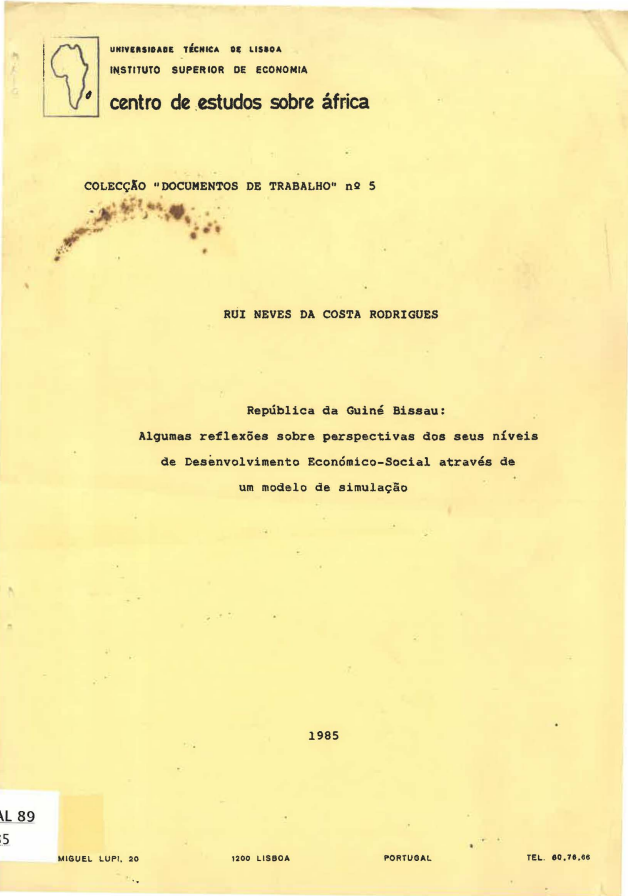
Working Paper 5/1985: República da Guiné Bissau: algumas reflexões sobre perspectivas dos seus níveis de desenvolvimento económico-social através de um modelo de simulação
Abstract:
Whenever one tries to formulate a development policy in the so-called underdeveloped countries, ‘one comes across a series of problems that transcend the exclusively economic sector: it is the social and political aspects, more properly institutional, that also condition the global structure, taking on a “almost” dominant in the formation of a concretely determined social totality. Concerned with economic aspects, the leaders focus almost exclusively on the problems of industrialization or non-industrialization, modernization of agriculture, monetary issues, financing strategy, etc. In República da Guiné Bissau: algumas reflexões sobre perspectivas dos seus níveis de desenvolvimento económico-social através de um modelo de simulação we believe that a philosophy of progress is inevitably necessary to arrive at a sociological definition of development. But this philosophy of progress and development must be based on realities. Trying to define progress: separately on the economic level, on the social level, on the political level, or on the cultural level, is to forget of its eminently global and historical character.
Quotation:
Rodrigues, Rui Neves da Costa .1985. “República da Guiné Bissau : algumas reflexões sobre perspectivas dos seus níveis de desenvolvimento económico-social através de um modelo de simulação”. Instituto Superior de Economia e Gestão. CEsA – Documentos de Trabalho nº 5/ 1985.
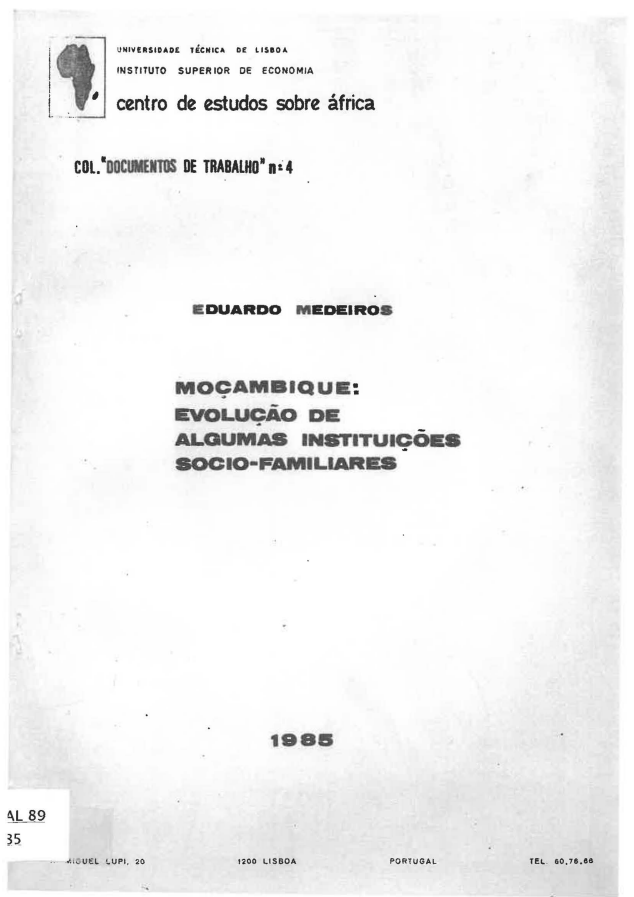
Working Paper 4/1985: Moçambique: evolução de algumas instituições socio-familiares
Abstract:
Moçambique : evolução de algumas instituições sócio-familiares was initially published as an article in the Domingo de Maputo newspaper in October and November 1984, when the Extraordinary Conference of the Organisation of Mozambican Women ( O. M. M. ) took place, giving rise to intense debate in Mozambican intellectual circles. It was later revised and in some points reformulated by its author for this collection of “Working Documents”.
In this article, we have touched on some aspects of the problem related to the family institutions of the past and the transformations observed in them throughout the different periods of the History of Mozambique. The structural changes and the dynamics of readaptation that these same institutions have shown in recent years are once again a response to the material conditions of their existence in the situation that the country has gone through in the last decade. The struggle for women’s emancipation is part of this global economic, social and political context, which the Law (Family, for example), Ideology and Organization will not be able to radically change by themselves. On the other hand, for economic and social development to be a process of profound transformations, without serious delays, a rigorous study of all these phenomena and social institutions is necessary, and rural planning accordingly.
Quotation:
Medeiros, Eduardo .1985. “Moçambique : evolução de algumas instituições sócio-familiares”. Instituto Superior de Economia e Gestão. CEsA – Documentos de Trabalho nº 4/1985.
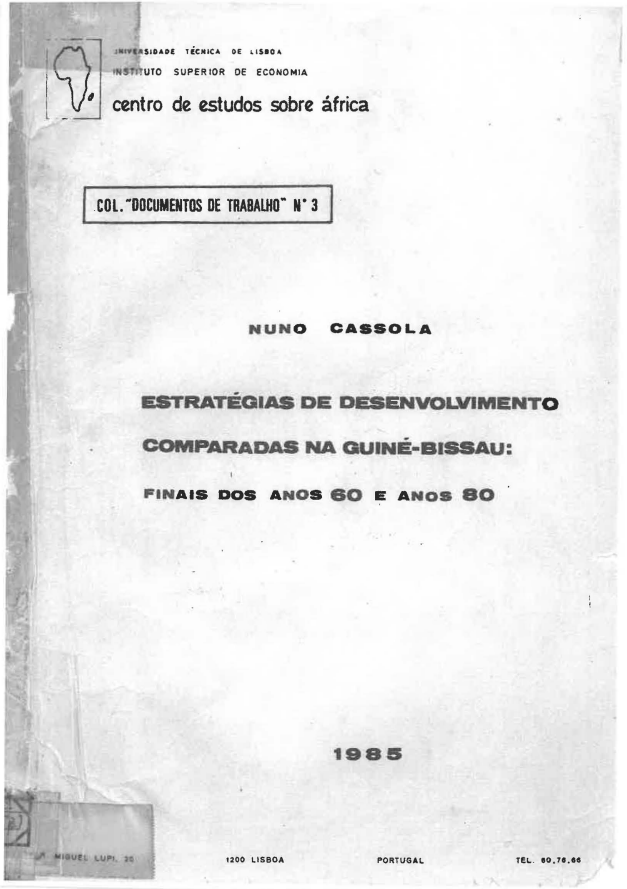
Working Paper 3/1985: Estratégias de desenvolvimento comparadas na Guiné-Bissau: finais dos anos 60 e anos 80
Abstract:
Estratégias de desenvolvimento comparadas na Guiné-Bissau: finais dos anos 60 e anos 80 is for us a first moment of reflection on Guinea-Bissau. The 20 pages we set out to write could easily be multiplied: either by developing in more detail the situation in the sixties, or by analyzing some particular aspects of the post-independence evolution. We believe that the essential axis of research should be oriented towards a detailed study of the economic and social changes that took place during the war. A fact that immediately comes to mind, for example, is the breakdown of food self-sufficiency, which, in the 1960s, was never recovered. What factors are behind this persistent food crisis? Is it just war, in one case, and drought plus smuggling, in the other? Only once we understand the transformations that took place in the 1960s will we be able to distinguish what was “endogenously” determined evolution from what was “endogenously” determined evolution.
This document is, in essence, the report presented by Dr Nuno Cassola in 1983-1984 in the course “Development Experiences in Africa” of the Masters Degree in Economics of the ISEG. The research work was carried out under the responsibility of Prof. Adelino Torres. This report has, voluntarily, an essentially empirical and circumscribed character, but it presents interesting – albeit preliminary – moments of reflection both on the articulation between the pre-independence period (especially the period of governance of General António Spínola) and the post-independence period (the 1980s in particular) and on the determination of factors which, rooted in the first period, explain and seem to strongly condition the second.
Quotation:
Cassola, Nuno. 1985. “Estratégias de desenvolvimento comparadas na Guiné-Bissau : finais dos anos 60 e anos 80” “. Instituto Superior de Economia e Gestão. CEsA – Documentos de Trabalho nº 3/1985.
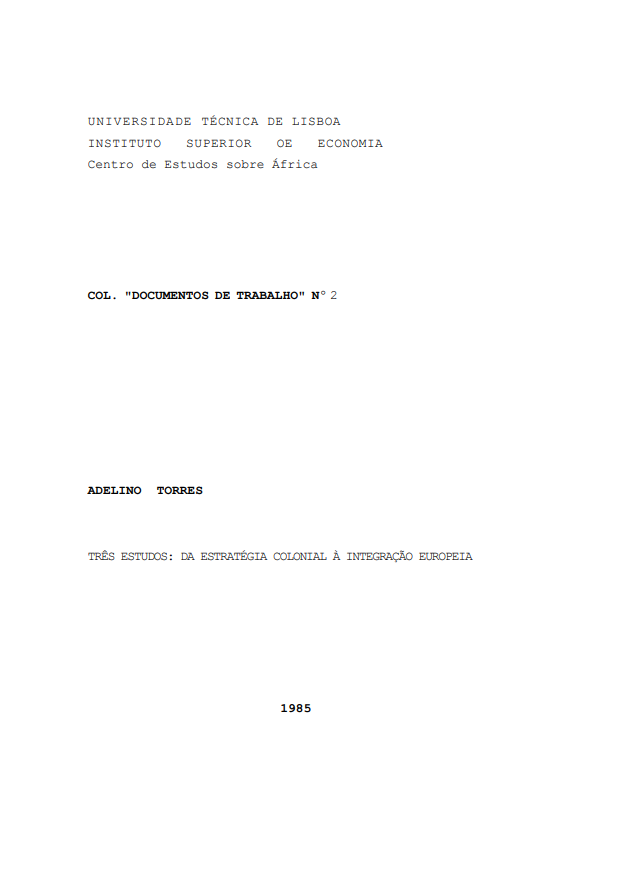
Working Paper 2/1985: Três estudos: da estratégia colonial à integração europeia
Abstract:
In Três estudos: da estratégia colonial à integração europeia, the three texts we reproduce below are of a relatively different nature, but their content, in our view, is complementary.
The first – “LE RÔLE DU CAPITAL BANCAIRE DANS LES COLONIES PORTUGAISES DE L’ANGOLA ET DE ST. TOMÉ DE 1864 AU DEBUT DU XX5 SIECLE” – took part in the Colloquium “Business Empires in West-Central Africa” which took place at the School of Oriental and African Studies (SOAS) at the University of London, in May 1982. the organizer of that Colloquium, Prof. G. Clarence–Smith, this communication, although modified in some points, was based on a chapter of the doctoral dissertation in Economics that we presented in 1981 at the Technical University of Lisbon. In 1983 this text was published in the journal African Economic History n° 12, edited by the University of Wisconsin-Madison (USA).
The second – “ESTRATÉGIA COLONIAL PORTUGUESA E ESTRUTURAS ECONÓMICAS DE ANGOLA NOS ANOS 1960-1970” – constituted a contribution to the Seminar “0 25 de Abril – Ten years later”, organized by Associação 25 de Abril from 2 to 5 May 1984, in Lisbon.
The third – “L’IDENTITÉ HISTORIQUE PORTUGAISE FACE AUX NOUVEAUX DEFIS DE L’INTEGRATION EUROPEENNE” – was presented at the Colloquium “Europe -Identité Culturelle et Modernité” held by the FORUM magazine, directed by Prof. Laurent Schwartz, at the Polytechnic School, Paris (June 1-3, 1984).
We had hoped that the works initially written in French would now be rewritten or at least presented in Portuguese. Unfortunately we are short of time: multiple academic and research tasks do not leave us the necessary availability to do so.
In any case, these studies – the last two in particular – should be seen simply as preliminary approaches. The second and third texts were written for the tight number of pages that this kind of colloquium usually imposes. Their aim was merely to set some parameters for the public discussion that should follow the presentation of their main lines. As such, it seems justified to insert them in a collection of “Working Papers“, submitting them to the eventual discussion of colleagues and students who are concerned by these issues.
Quotation
Torres, Adelino. 1985. “Três estudos: da estratégia colonial à integração europeia”. Instituto Superior de Economia e Gestão. CEsA – Documentos de Trabalho nº 2/1985
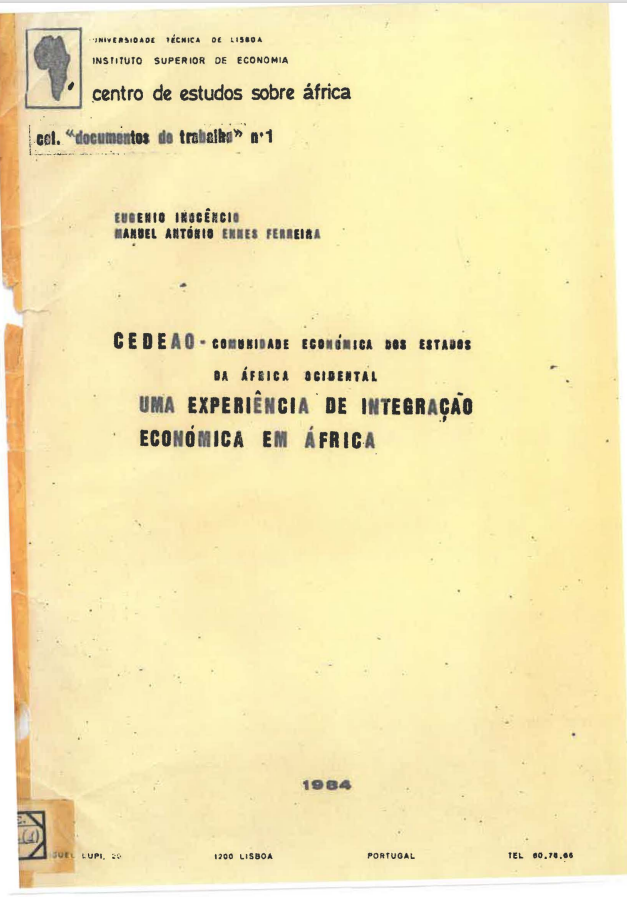
Working Paper 1/1984: Uma experiência de integração económica em África
Abstract:
The Working Papers collection consists of short monographs written by members and collaborators of CEsA/CSG/ISEG/ULisboa. These documents are provisional and aim to provide elements of information and scientific reflection on economic and social issues object of research of this Centre. ECOWAS – Uma experiência de integração económica em África , started as a 1983-1984 report by Eugénio Inocêncio and Manuel Ennes Ferreira in the subject of International Economic Organizations (5th year) taught by Dr. César Cortes in the Degree in Economics. Later on, its authors restructured the initial text in order to integrate it in this collection. It is this second modified version that is reproduced here. The work seeks to build a historical and current framework of ECOWAS, and provide elements that serve as a starting point for monitoring its evolution. Although not intending to be a theoretical study on integration in Africa, care was taken to organize the data considered to be the most relevant to include a set of more abstract aspects such as: i) regional leadership relationship (Lagos/Dakar •Abidjan); ii) changes in the world economy and economic integration in Africa; iii) economic integration in Africa and African economic nationalism (regionalism).
Quotation:
Inocêncio, Eugénio e Manuel Ennes Ferreira .1984. “Uma experiência de integração económica em África”. Instituto Superior de Economia. CEsA – Documento de Trabalho nº 1/84.
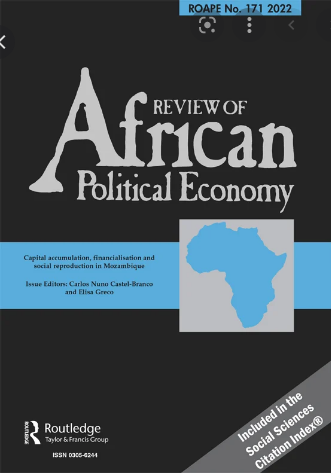
Class, politics and dynamic accumulation processes around the Sino-Mozambican rice project in the lower Limpopo, 2005–2014
Class, politics and dynamic accumulation processes around the Sino-Mozambican rice project in the lower Limpopo, 2005–2014 by Ana Sofia Ganho levels a Marxist political economy lens at the development of the Sino-Mozambican rice project in the lower Limpopo valley. Focusing on a defined time period, 2005–14, it interrogates the ways that class dynamics shaped, and were shaped by, China’s development cooperation model for Mozambique, and examines changing Mozambican accumulation interests in the context of sudden price rises in agricultural commodities. The article aims to understand how this project relates to Mozambique’s dominant strategy for capital accumulation, such as the dynamics it has enabled for capitalist factions in power. But it also seeks to comprehend the rural differentiation dynamics that the project has generated, particularly with regard to the desideratum to create a new group of rural capitalists. Together with historically situated challenges, this can provide crucial information about the form(s) that the agrarian question of transition to a capitalist agriculture is taking in Mozambique.
Abstract:
This study levels an international political economy lens at the development of the Sino-Mozambican rice project in the lower Limpopo, by examining how class relations shaped and were shaped by global trends, Chinese resources and Mozambican dynamic accumulation interests. The paper argues that the project has served the expansionist interests of the ruling capitalist group associated with central government circles, limiting land-based possibilities at province level. In addition, the plan to locally transform small producers into rural capitalists through ‘modern’ Chinese methods has failed to confront the historical interdependence of the commercial and so-called family sectors and the diversity of livelihood sources for the reproduction of food and labour.
Quotation:
Ganho, Ana Sofia (2022) Class, politics and dynamic accumulation processes around the Sino-Mozambican rice project in the lower Limpopo, 2005–2014, Review of African Political Economy, 49:171, 107-137, DOI: 10.1080/03056244.2022.2050557
Access the article here.

Financialization, narrow specialization of production and capital accumulation in Mozambique
In post-independence Mozambique, national capitalism developed from the ashes of state-centred accumulation built around the dominant social structures of production that were inherited from colonialism. These very specific historical conditions weighed heavily on the structures of accumulation, which later were subjected to neoliberal economic reforms, becoming heavily dependent on inflows of private international finance and resulting in growing financialisation of the economy and of the state, alongside increasingly narrow specialisation of production. Narrow specialisation, also called primarisation, consists in the reduction of the number of industries, sectors, activities and products; the concentration of production and trade around a smaller range of primary commodities for export; increasingly basic and simple production processes, products and levels of processing and articulation; and fewer options and capabilities to promote linkages. In turn, financialisation and primarisation reinforced each other in an increasingly speculative mode of accumulation. Starting from the specific analysis of the historical logic of the mode of capital accumulation in Mozambique (Castel-Branco, 2022), Financialization, narrow specialization of production and capital accumulation in Mozambique by Carlos Nuno Castel-Branco and Diogo Maia will demonstrate the dynamics of financialisation and of the growing primarisation of production, and the connection between the two.
Abstract:
The article argues that the historical conditions under which national capitalism developed in post-independence Mozambique pushed the economy towards growing financialisation and narrower specialisation of production around increasingly basic and simple activities. The paper argues that changing these dynamics of accumulation requires conscious industrial strategies focused on diversification and articulation of production, which cannot be achieved without challenging the extractive mode of accumulation and the power relationships associated with it.
Quotation:
Castel-Branco, Carlos Nuno; and Diogo Maia. 2022. “Financialization, narrow specialization of production and capital accumulation in Mozambique”. Review of African Political Economy, VOL. 49, NO. 171, 46-66 https://doi.org/10.1080/03056244.2022.2049143
Access the article here.

Mozambique – neither miracle nor mirage
Mozambique – neither miracle nor mirage by Carlos Nuno Castel-Branco and Elisa Greco explores how over two decades, in the 1990s and 2000s, international organisations, development cooperation agencies, financial institutions and the media often described the Mozambican economic, social and political trajectory as a ‘miracle’. Hailed as the ‘rising star’ of Africa in 2005 by the New York Times (2005) and by The Economist, the country has long been praised by neoliberal institutions as a model reformer, open and attractive to foreign direct investment (FDI), and for its high rates of economic growth, soaring primary commodity exports and one-digit inflation. While a milder version of this image of a Mozambican ‘miracle’ persisted throughout the 2010s, it started to clash with the reality of worsening inequality, poverty and crisis in social reproduction, as well as the emergence of the first clear signs of a debt crisis yet to come. In the main cities, violent riots triggered by rising costs of basic wage goods and services, over and above average inflation, erupted in February 2008 and again in September 2010. In September 2010, The Economist described these riots as the revolt of the ‘angry poor’, which did not deter international financial think tanks and media from continuing to emphasise the Mozambican ‘miracle’ (The Economist 2010). The country saw the contradiction of worsening poverty, high aid dependency and inequality at the same time as it was being described by the Financial Times as ‘at the centre of unprecedented international investor attention’ (Financial Times 2012, 2010). In May 2014, in her speech to the Africa Rising conference held in Maputo, IMF Managing Director Christine Lagarde highlighted Mozambique’s impressive performance with respect to economic growth as being the result of decades of institution building and sound macroeconomic management, which justified the IMF’s formal permission for Mozambique to obtain new loans on non-concessional terms (Orre and Rønning 2017). Two years later, in 2016, The Economist highlighted the country’s soaring sovereign debt in a context of increasing FDI and aid inflows, and the creditworthiness of the Mozambican economy was downgraded by credit rating agencies from stable average, where it had been from 2003 to 2015, to severe risk of default (Castel-Branco 2020). How can we make sense of this somehow contradictory information? Is Mozambique a ‘miracle’ or a ‘mirage’?
Abstract:
Editorial of the special issue of the Review of African Political Economy (RoAPE), titled “Capital accumulation, financialisation and social reproduction in Mozambique”, volume 49, number 171, March 2022.
Quotation:
Castel-Branco, Carlos Nuno; and Elisa Greco. 2022. “Mozambique – neither miracle nor mirage”. Review of African Political Economy, VOL. 49, NO. 171, 1-10, https://doi.org/10.1080/03056244.2022.2047297
Access the article here,

The historical logic of the mode of capital accumulation in Mozambique
This article by Carlos Nuno Castel-Branco investigates the historical logic of the mode of capital accumulation in Mozambique. By historical logic we mean the objective explanation of the specific characteristics based on an understanding of the country’s historical foundations, and the conflicts and tensions within and related to its structures of accumulation.
Abstract:
This article critically analyses the political economy dynamics and trajectory of the mode of capital accumulation in post-independence Mozambique, focusing on the capitalist restructuring that followed the adoption of the Washington Consensus from the late 1980s. The article highlights the main structural characteristics, dynamics and tensions in the economy, the relationships and conflicts that explain why they reproduce and expand, what makes them change and the nature of the crises that emerge. The argument is that the recent trajectory of the Mozambican economy was not inevitable, and that it can be logically understood and derived from the existing historical conditions of accumulation. Understanding this historical logic enables us to articulate socially transformative actions which are drawn from the objective and concrete analysis of the mode of accumulation and its contradictions, countering idealistic perspectives in political economy.
Quotation:
Castel-Branco, Carlos Nuno. 2022. “The historical logic of the Mode of Capital Accumulation in Mozambique”. Review of African Political Economy, VOL. 49, NO. 171, 11–45 https://doi.org/10.1080/03056244.2022.2040225
Access the article here.
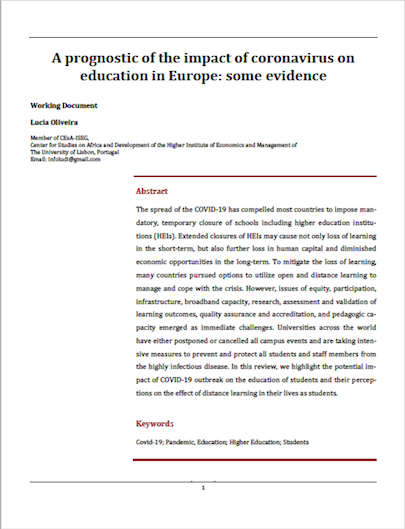
A prognostic of the impact of coronavirus on education in Europe: some evidence
In A prognostic of the impact of coronavirus on education in Europe: some evidence, Lúcia Oliveira highlights the impact of the COVID-19 outbreak on student education and their perceptions corcerning the effect of distance learning on their lives as students. Thus, we conducted a survey to university students in Portugal, during the month of July, who composed a sample of convenience due to time constraints and at the end of the school year, which made the collection of information extremely important to evaluate the real impact at that very moment, taking also into account other external factors. We found out that students live difficult moments at the educational and private level due to the complex professional situation of their parents. All of these factors have a major impact in terms of mental health, as many of them reported experiencing anxiety and stress.
Abstract:
The spread of COVID-19 forced most countries to temporarily close educational institutions. It may cause not only short-term learning loss, but also an additional loss of human capital and reduced long-term economic opportunities. To mitigate this loss, many countries have opted for distance learning. However, issues of equity, participation and evaluation of results emerged as challenges. Universities have postponed or cancelled classes and are taking measures to protect all students and staff from highly infectious diseases. In this study, we highlight the impact of the COVID-19 outbreak on student education and their perceptions corcerning the effect of distance learning on their lives as students. Thus, we conducted a survey to university students in Portugal, during the month of July, who composed a sample of convenience due to time constraints and at the end of the school year, which made the collection of information extremely important to evaluate the real impact at that very moment, taking also into account other external factors. Given the exploratory nature of this empirical research, data analysis is descriptive, measuring opinions, attitudes and perceptions that students have about the impact of the pandemic on their educational path. We found out that students live difficult moments at the educational and private level due to the complex professional situation of their parents. All of these factors have a major impact in terms of mental health, as many of them reported experiencing anxiety and stress. It will be a challenge for universities to deal with this new reality, to prepare an uncertain future not only for students, but also for professionals, who will need more preparation and training to face the new teaching methodologies.
Quotation:
“A prognostic of the impact of coronavirus on education in Europe: some evidence.” 4. International Seminar. Education, Territories and Human Development. Catolica, Faculty of Education and Psychology, Porto. pp. 550-557 https://www.fep.porto.ucp.pt/sites/default/files/files/FEP/eventos/Atas-SIETDH-2021.pdf https://www.repository.utl.pt/handle/10400.5/23273
Access the article here.





